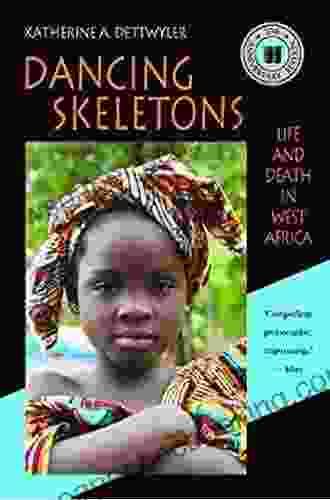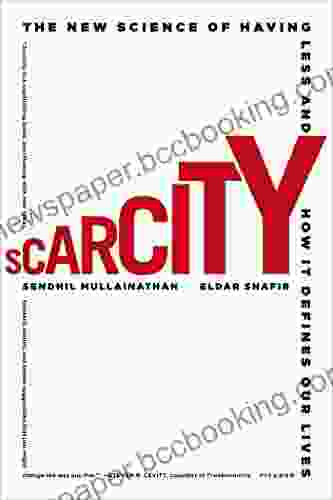Scarcity: Why Having Too Little Means So Much

Scarcity is a powerful force that can shape our thoughts, feelings, and behaviors. When we feel like we don't have enough of something, we often experience anxiety, stress, and even despair. But what if scarcity is not what we think it is? What if it's actually a good thing?
In his book Scarcity, Sendhil Mullainathan and Eldar Shafir argue that scarcity is not simply a lack of resources. It's a mindset. When we feel scarce, we tend to focus on what we don't have, rather than what we do have. This can lead to a vicious cycle of negative thoughts and behaviors.
4.5 out of 5
| Language | : | English |
| File size | : | 857 KB |
| Text-to-Speech | : | Enabled |
| Screen Reader | : | Supported |
| Enhanced typesetting | : | Enabled |
| X-Ray | : | Enabled |
| Word Wise | : | Enabled |
| Print length | : | 302 pages |
But Mullainathan and Shafir also show that scarcity can be a catalyst for positive change. When we feel scarce, we are more likely to be creative and resourceful. We are also more likely to cooperate with others and to help those in need.
Scarcity is a fact of life. But it doesn't have to be a negative force. By understanding the psychology of scarcity, we can learn to use it to our advantage.
The Psychology of Scarcity
Scarcity is a powerful psychological trigger. When we feel scarce, our brains go into a state of high alert. We become more focused on our immediate needs and less able to think long-term. We are also more likely to experience negative emotions, such as anxiety, stress, and despair.
This is because scarcity activates the amygdala, a brain region that is responsible for processing fear and other negative emotions. The amygdala sends signals to the hypothalamus, which in turn triggers the release of stress hormones, such as cortisol.
Cortisol has a number of negative effects on the body and mind. It can increase heart rate and blood pressure, suppress the immune system, and damage the hippocampus, a brain region that is involved in memory and learning.
Scarcity can also lead to a number of cognitive biases. For example, people who feel scarce are more likely to:
- Overestimate the probability of negative events
- Underestimate the probability of positive events
- Make impulsive decisions
- Be less cooperative with others
The Benefits of Scarcity
While scarcity can have negative effects, it can also be a catalyst for positive change. When we feel scarce, we are more likely to be creative and resourceful. We are also more likely to cooperate with others and to help those in need.
This is because scarcity can motivate us to find new ways to meet our needs. It can also make us more appreciative of what we have.
For example, a study by Mullainathan and Shafir found that people who were given a limited amount of money to spend were more likely to come up with creative ways to use it. They were also more likely to save money and to invest in their future.
Another study by the same researchers found that people who were given a limited amount of time to complete a task were more likely to cooperate with others and to help those in need. They were also more likely to persist in the face of challenges.
How to Use Scarcity to Your Advantage
Scarcity is a fact of life. But it doesn't have to be a negative force. By understanding the psychology of scarcity, we can learn to use it to our advantage.
Here are a few tips:
- Be aware of your scarcity mindset. When you feel scarce, take a step back and ask yourself why. Are you really lacking in resources, or are you just feeling overwhelmed?
- Focus on your strengths. When you feel scarce, it's easy to get caught up in what you don't have. Instead, focus on your strengths and what you can do.
- Be creative. Scarcity can be a catalyst for creativity. When you feel like you don't have enough, it forces you to find new ways to meet your needs.
- Cooperate with others. When you feel scarce, don't be afraid to ask for help. There are many people who are willing to help those in need.
- Be grateful for what you have. When you feel scarce, it's easy to take what you have for granted. Instead, take some time to appreciate the things that you do have.
Scarcity is a part of life. But it doesn't have to be a negative force. By understanding the psychology of scarcity, we can learn to use it to our advantage.
When we feel scarce, we can use it as a catalyst for creativity, cooperation, and gratitude. We can also use it to learn more about ourselves and what we really need.
So the next time you feel scarce, don't despair. Embrace it. It could be the best thing that ever happens to you.
4.5 out of 5
| Language | : | English |
| File size | : | 857 KB |
| Text-to-Speech | : | Enabled |
| Screen Reader | : | Supported |
| Enhanced typesetting | : | Enabled |
| X-Ray | : | Enabled |
| Word Wise | : | Enabled |
| Print length | : | 302 pages |
Do you want to contribute by writing guest posts on this blog?
Please contact us and send us a resume of previous articles that you have written.
 Book
Book Novel
Novel Page
Page Chapter
Chapter Text
Text Story
Story Genre
Genre Reader
Reader Library
Library Paperback
Paperback E-book
E-book Magazine
Magazine Newspaper
Newspaper Paragraph
Paragraph Sentence
Sentence Bookmark
Bookmark Shelf
Shelf Glossary
Glossary Bibliography
Bibliography Foreword
Foreword Preface
Preface Synopsis
Synopsis Annotation
Annotation Footnote
Footnote Manuscript
Manuscript Scroll
Scroll Codex
Codex Tome
Tome Bestseller
Bestseller Classics
Classics Library card
Library card Narrative
Narrative Biography
Biography Autobiography
Autobiography Memoir
Memoir Reference
Reference Encyclopedia
Encyclopedia Judith A Owens
Judith A Owens Kara Goldin
Kara Goldin Julian Bound
Julian Bound Trevor Moawad
Trevor Moawad Karen Duderstadt
Karen Duderstadt Stacey Marie Kerr
Stacey Marie Kerr Karen Mcleod Cox
Karen Mcleod Cox Kate Egan
Kate Egan Margaret Davidson
Margaret Davidson Jules Archer
Jules Archer K P Kojo
K P Kojo Julius Erving
Julius Erving Lois Strachan
Lois Strachan K A Linde
K A Linde Karen Coleman
Karen Coleman Sparknotes
Sparknotes Peggy Macdonald
Peggy Macdonald Karen Karon
Karen Karon Judith A Muschla
Judith A Muschla Kim Levings
Kim Levings
Light bulbAdvertise smarter! Our strategic ad space ensures maximum exposure. Reserve your spot today!

 Abe MitchellDelve into the Enigmatic Nile: A Literary Journey with "Reflections In The...
Abe MitchellDelve into the Enigmatic Nile: A Literary Journey with "Reflections In The...
 F. Scott FitzgeraldVision of Your Birth Experience: Unlocking the Transformative Power of Your...
F. Scott FitzgeraldVision of Your Birth Experience: Unlocking the Transformative Power of Your... Roald DahlFollow ·6.9k
Roald DahlFollow ·6.9k Julian PowellFollow ·4.7k
Julian PowellFollow ·4.7k Junot DíazFollow ·18k
Junot DíazFollow ·18k Jean BlairFollow ·2.1k
Jean BlairFollow ·2.1k Ray BlairFollow ·9.2k
Ray BlairFollow ·9.2k Jason HayesFollow ·13k
Jason HayesFollow ·13k Michael ChabonFollow ·18.7k
Michael ChabonFollow ·18.7k Herman MitchellFollow ·4.8k
Herman MitchellFollow ·4.8k

 Drew Bell
Drew BellLife and Death in West Africa: A Groundbreaking Account...
A Journey Through...

 Stanley Bell
Stanley BellMaster the Art of Fly Fishing Line Management: A...
Are you an avid fly...

 Ernest Powell
Ernest PowellUnleash Your Entrepreneurial Spirit: A Comprehensive...
In the competitive...

 Derrick Hughes
Derrick HughesMaster Your Ride: The Ultimate Guide to Road Bike...
Are you ready to elevate your cycling...

 Camden Mitchell
Camden MitchellUnveiling the Enchanting World of American Royals III:...
Embark on a Captivating Royal Saga: American...

 Richard Simmons
Richard SimmonsUnveiling the Secrets of Fly Tying: A Comprehensive...
In the realm of...
4.5 out of 5
| Language | : | English |
| File size | : | 857 KB |
| Text-to-Speech | : | Enabled |
| Screen Reader | : | Supported |
| Enhanced typesetting | : | Enabled |
| X-Ray | : | Enabled |
| Word Wise | : | Enabled |
| Print length | : | 302 pages |








